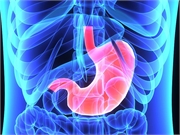Eradication rates with triple therapy unaffected by resistance to clarithromycin, metronidazole
THURSDAY, May 7, 2020 (HealthDay News) — A novel rifabutin-based triple therapy (RHB-105) is effective for eradication of Helicobacter pylori, with eradication rates unaffected by resistance to clarithromycin or metronidazole, according to a study published online May 5 in the Annals of Internal Medicine.
David Y. Graham, M.D., from the Baylor College of Medicine in Houston, and colleagues examined the effectiveness of RHB-105 for eradication of H. pylori in a phase 3 double-blind trial conducted at 55 clinical research sites in the United States. A total of 455 treatment-naive adults were randomly assigned to receive either RHB-105 (amoxicillin, omeprazole, and rifabutin) or active comparator (amoxicillin and omeprazole).
The researchers found that the eradication rate was significantly higher with RHB-105 than with the active comparator (83.8 versus 57.7 percent) in the intention-to-treat analysis. Resistance to clarithromycin or metronidazole did not affect eradication rates. There was no detection of rifabutin resistance. Diarrhea (10.1 percent with RHB-105 versus 7.9 percent with the active comparator), headache (7.5 versus 7.0 percent), and nausea (4.8 versus 5.3 percent) were the most commonly reported adverse events.
“A new treatment option will help address the unmet need of providing effective, well-tolerated therapy in an environment of clinically significant antibiotic resistance,” the authors write.
Several authors disclosed financial ties to the biopharmaceutical industry, including RedHill Biopharma, which funded the study.
Copyright © 2020 HealthDay. All rights reserved.








